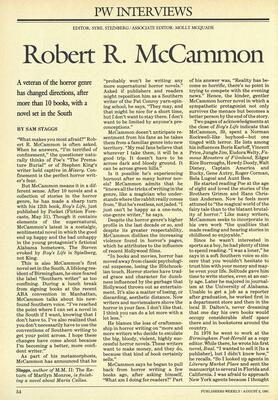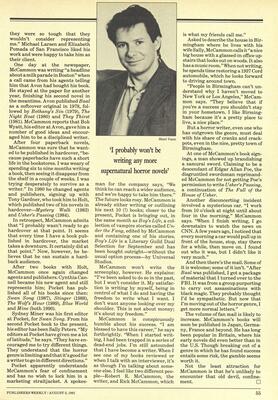
|

|
From the Archives:
Robert R. McCammon
A veteran of the horror genre has changed directions, after
more than 10 books, with a novel set in the South
By Sam Skaggs
|
"What makes you most afraid?" Robert R. McCammon is often asked.
When he answers, "I'm terrified of confinement," the questioner
naturally thinks of Poe's "The Premature Burial" or of Stephen
King's writer held captive in Misery. Confinement is the perfect
horror writer's fear.
But McCammon means it in a different sense. After 10 novels and a
collection of stories in the horror genre, he has made a sharp turn
with his 12th book, Boy's Life, just published by Pocket
(Fiction Forecasts, May 31). Though it contains elements of the
supernatural, McCammon's latest is a nostalgic, sentimental novel in
which the good end up happy and the bad unhappy in the young
protagonist's fictional Alabama hometown. The Steven evoked by
Boy's Life is Spielberg, not King.
This is also McCammon's first novel set in the South. A lifelong resident
of Birmingham, he once feared the label "Southern writer" as too
confining. During a lunch break from signing books at the recent ABA
convention in Manhattan, McCammon talks about his new-found Southern voice.
"I've reached the point where I can set a novel in the South if I
want, knowing that I don't have to. I've also realized that you don't
necessarily have to use the conventions of Southern writing to get your
point across. I hope these changes have come about because I'm becoming a
better, more confident writer."
As part of his metamorphosis, McCammon has announced that he "probably
won't be writing any more supernatural horror novels." Asked if
publishers and readers might reposition him as a Southern writer of
the Pat Conroy yarn-spinning school, he says, "They may, and that might
be nice for a short time, but I don't want to stay there. I don't want
to be limited by anyone's pre-conceptions."
McCammon doesn't anticipate resentment from his fans as he takes them
from a familiar genre into new territory. "My real fans believe that
wherever I take them, it will be a good trip. It doesn't have to be
across dark and bloody ground. It can be across green hills."
Is it possible he's experiencing burnout after so many horror novels?
McCammon admits that he "knows all the tricks of writing in the genre,
like a magician who understands where the rabbit really comes from."
But he's restless, not jaded. "I just can't be happy as a one-note,
one-genre writer," he says.
Despite the horror genre's higher profile in the last decade or so,
and despite its greater respectability, McCammon dislikes the
increasing violence found in horror's pages, which he attributes to
the influence of recent Hollywood films.
"In books and movies, horror has moved away from classic psychological
suspense, losing the Hitchcockian touch. Horror stories have traded
grace and character for dumbness influenced by the garbage that
Hollywood throws out as entertainment. It's also a matter of losing,
or discarding, aesthetic distance. Now writers and moviemakers shove
the horror in your face. I don't like that. I think you can do a lot
more with a lot less."
He blames the loss of craftsmanship in horror writing on "more and
more writers who decide to emulate the big, bloody, violent, highly
successful horror novels. These writers want to make money, and they
do, because that kind of book certainly sells.
McCammon says he began to pull back from horror writing a few books ago,
after asking himself, "What am I doing for readers?" Part of his
answer was, "Reality has become so horrific, there's no point in
trying to compete with the evening news." Hence, the kinder, gentler
McCammon horror novel in which a sympathetic protagonist not only survives
the menace but becomes a better person by the end of the story.
Two pages of acknowledgments at the close of Boy's Life
indicate that McCammon, 39, spent a Norman Rockwell-like boyhood—but
one tinged with terror. He lists among his influences Boris Karloff,
Vincent Price, Jungle Jim, Eudora Welty, Famous Monsters of
Filmland, Edgar Rice Burroughs, Howdy Doody, Walt Disney, Captain
America and Bucky, Gene Autry, Roger Corman, Bela Lugosi and Aunt Bea.
He started reading Poe at the age of eight and loved the stories of
the Brothers Grimm and Hans Christian Andersen. Now he feels more
attuned to "the magical world of the fairy tale than to the blatant
brutality of horror." Like many writers, McCammon seeks to incorporate
in his own work "the qualities that made reading and hearing stories
in childhood so enjoyable."
Since he wasn't interested in sports as a boy, he had plenty of time to
spend reading. "I was a loner," he says in a soft Southern voice
so sincere that you wouldn't hesitate to trust him with your money and
maybe even your life. Solitude gave him time to write stories, even at an
early age. Later he majored in journalism at the University of Alabama.
Unable to get a job as a reporter after graduation, he worked first in a
department store and then in the local B. Dalton's, never dreaming that one
day his own books would occupy considerable shelf space there and in
bookstores around the country.
In 1976 he went to work at the Birmingham Post-Herald as a copy
editor. While there, he wrote his first novel, Baal. "I wanted
to sell it [to a publisher], but I didn't know how," he recalls.
"So I looked up agents in Literary Market Place and sent the
manuscript to several in Florida and California. I was afraid to approach
New York agents because I thought they were so tough that they wouldn't
consider representing me." Michael Larsen and Elizabeth Pomada of San
Francisco liked his work and were happy to take him as their client.
One day at the newspaper, McCammon was writing "a headline about a
milk parade in Boston" when a call came from his agents telling him
that Avon had bought his book. He stayed at the paper for another
year, finishing his second novel in the meantime. Avon published
Baal as a softcover original in 1978, followed by Bethany's
Sin (1979), The Night Boat (1980) and They Thirst
(1981). McCammon reports that Bob Wyatt, his editor at Avon, gave him
a number of good ideas and encouraged him to be a disciplined writer.
After four paperback novels, McCammon was sure that he wanted to be
published in hardcover, "because paperbacks have such a short life in
the bookstores. I was weary of spending six to nine months writing a
book, then seeing it disappear from the shelf in a couple of weeks. I
was trying desperately to survive as a writer." In 1980 he changed
agents and publishers, signing up with Michael Larsen and Elizabeth
Pomada, who took him to
Holt, which published two of his novels in hardcover—Mystery
Walk (1983) and Usher's Passing (1984).
In retrospect, McCammon admits that "I probably wasn't ready to go
hardcover at that point. it seems that every time I have a book
published in hardcover, the market takes a downturn. It certainly did
at that point." Now, however, he believes that he can sustain a
hardback audience.
After two books with Holt, McCammon once again changed agents and
publishers. Tony Gardner became his new agent and still represents
him; Pocket has published all of his books since then: Swan
Song (1987), Stinger (1988), The Wolf's Hour (1989),
Blue World and Mine (both 1990).
Sydney Miner was his first editor at Pocket, for Swan Song.
From his second Pocket book to the present, his editor has been Sally
Peters. "My editors at Pocket have given me a lot of latitude," he
says. "They have encouraged me to try different things. They
understand that the horror genre is limiting and that it's good for a
writer to go indifferent directions."
Pocket apparently understands McCammon's fear of confinement and has
no wish to lock him in a marketing straitjacket. A spokesman for the
company says, 'We think he can reach a wider audience, and we're happy
to take him there."
The future looks rosy. McCammon is already either writing or outlining
his next 10 (!) books; closer to the present, Pocket is bringing out,
in the same month as Boy's Life, a collection of vampire
stories called Under the Fang, edited by McCammon and
containing one of his stories. Boy's Life is a Literary Guild
Dual Selection for September and has been bought outright—without
the usual option process—by Universal Studios.
McCammon won't write the screenplay, however. He explains: "I've been
asked to do so in the past, but I won't consider it. My satisfaction
is writing by myself, being in control of what I do and having the
freedom to write what I want. I don't want anyone looking over my
shoulder. This is not about money; it's about my freedom."
McCammon is conspicuously humble about his success. "I am blessed to
have this career," he says forthrightly. "When I started writing, I
had been trapped in a series of dead-end jobs. I'm still astounded
that I have become a writer. When I see one of my books reviewed or
when I talk with an interviewer, it's as though I'm talking about
someone else. I feel like two different people—Robert R. McCammon,
the writer, and Rick McCammon, which is what my friends call me."
Asked to describe the house in Birmingham where he lives with his wife
Sally, McCammon calls it "a nice big house with a glassed-in office
upstairs that looks out on woods. It also has a music room." When not
writing, he spends time restoring a 1937 Cord automobile, which he
looks forward to driving around town.
"People in Birmingham can't understand why I haven't moved to New York
or Los Angeles," McCammon says. "They believe that if you're a
success you shouldn't stay in your hometown. I like Birmingham because it's
a pretty place to live, a nice place."
But a horror writer, even one who has outgrown the genre, must deal
with his share of cranks and crackpots, even in the nice, pretty town
of Birmingham.
At one of McCammon's book signings, a man showed up brandishing a
samurai sword. Claiming to be a descendant of Edgar Allan Poe, the
disgruntled swordsman reprimanded McCammon for not getting Poe's
permission to write Usher's Passing, a continuation of The
Fall of the House of Usher.
Another disconcerting incident involved a mysterious car. "I work from
10 o'clock at night until about four in the morning," McCammon says.
"When I finish writing, I go downstairs to watch the news on CNN. A
few years ago, I noticed that every morning a car would pull up in front of
the house, stop, stay there for a while, then move on. I found out who it
was, but I didn't like it very much."
And then there's the mail. Some of it is welcome; some of it isn't.
"After Baal was published, I got a package of material that I
turned over to the FBI. It was from a group purporting to carry out
assassinations with black magic. They probably thought I'd be sympathetic.
But now that I'm moving out of the horror genre, I get more normal
letters."
The volume of fan mail is likely to increase. McCammon's books will
soon be published in Japan, Germany, France and beyond. He has long
been popular in Britain, where his early novels did even better than
in the U.S. Though breaking out of a genre in which he has found
success entails some risk, the gamble seems worth it.
Not the least attraction for McCammon is that he's unlikely to
encounter that old devil, confinement.
Staggs, author of M.M. II: The Return of Marilyn Monroe, is
finishing a novel about Maria Callas.
|